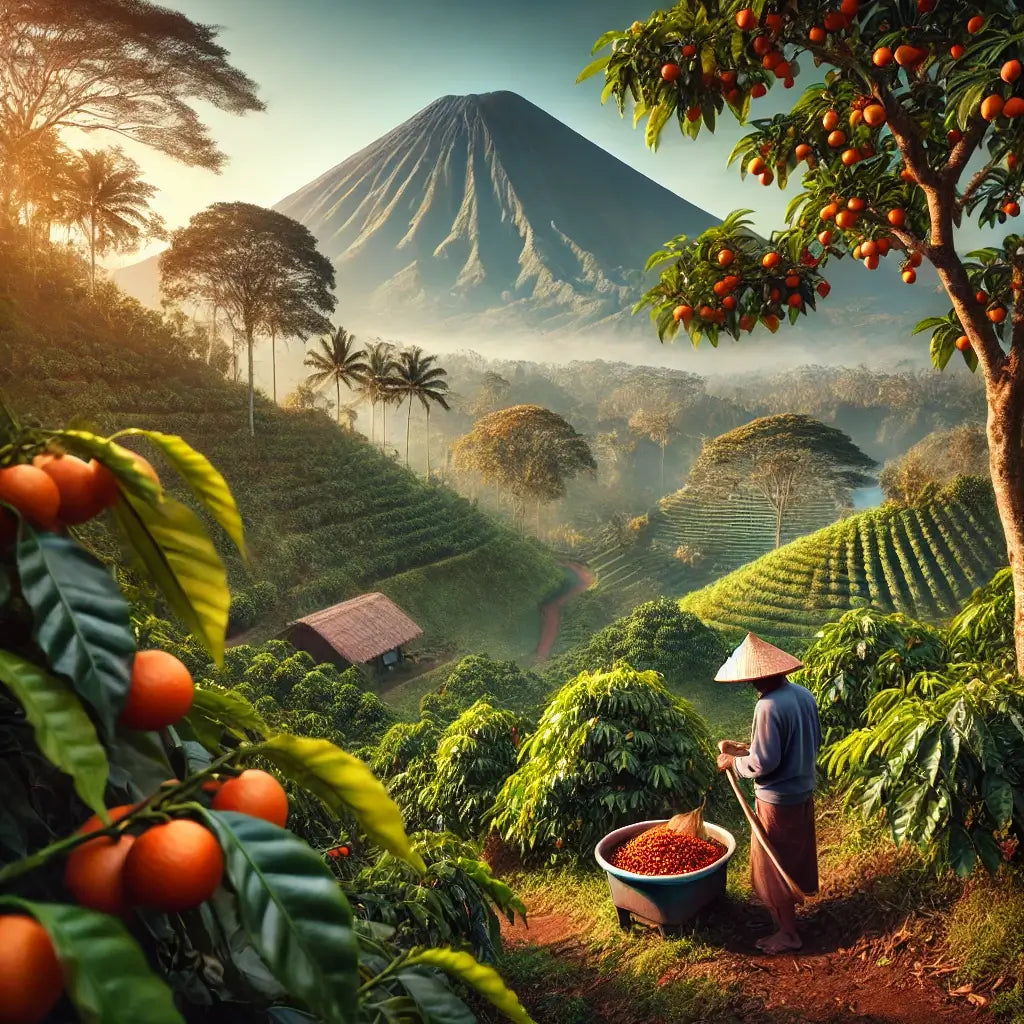Bali. The very name conjures up images of lush rice terraces, sacred temples, and waves rolling onto black sand beaches. But there’s another treasure hidden within the volcanic landscape of this island paradise—one that doesn’t just tantalize the eyes but also the palate: coffee. Bali coffee beans have developed a reputation for their superior quality, rich flavors, and artisanal production, but this wasn’t always the case. The journey of coffee in Bali is a tale of colonialism, cultural adaptation, and modern sustainability efforts that have turned this small Indonesian island into a rising star in the specialty coffee world.
The Arrival of Coffee in Bali
Coffee first arrived in Indonesia in the late 1600s, courtesy of Dutch colonialists who saw the islands as fertile ground for a new cash crop. They smuggled Arabica seeds out of Yemen—back when the Ottomans still had a tight grip on the global coffee trade—and planted them in Java, Sumatra, and Sulawesi. By the 18th century, Indonesia had become one of the largest coffee exporters in the world, fueling the European demand for this exotic new drink.
Bali, however, was late to the coffee game. Unlike Java, which was the heart of the Dutch colonial operations, Bali remained relatively independent until the early 1900s. It wasn’t until Dutch influence spread further into the archipelago that coffee cultivation began to take hold in Bali’s volcanic highlands, primarily in the Kintamani region.
How Balinese Culture Shaped Coffee Production
Unlike Java, where coffee production was built on large colonial plantations and forced labor, Bali took a different path. The island’s unique Subak system—a traditional cooperative farming practice originally designed for rice cultivation—was adapted for coffee. Subak is deeply tied to Balinese Hinduism, emphasizing harmony between humans, nature, and the spiritual world.
Because of this cooperative approach, coffee farms in Bali have always been small-scale, family-run operations, rather than massive plantations. Farmers grow their coffee under the shade of orange and tangerine trees, allowing for natural cross-pollination that gives Bali’s beans their signature bright citrus notes. This integration of agriculture and ecology results in a more sustainable and organic growing environment, long before “shade-grown” became a marketing buzzword.
The Rise of Kintamani Coffee
The heart of Balinese coffee production is Kintamani, a high-altitude region perched between the towering Mount Batur and Mount Agung. These volcanoes have blessed the land with mineral-rich soil, which in turn enriches the flavor profile of the coffee grown here. This terroir—combined with traditional wet-hulled processing—creates a coffee that is distinctly Balinese: bright acidity, floral aromas, and a velvety mouthfeel.
For much of the 20th century, however, Balinese coffee remained a hidden gem, primarily consumed by locals or sold to neighboring islands. It wasn’t until the early 2000s that Bali’s coffee industry saw a major shift, thanks to international demand for high-quality, ethically sourced beans.
From Commodity to Specialty Coffee
Up until the late 20th century, most Indonesian coffee was treated as a bulk commodity, sold without much regard for origin or flavor distinction. But as specialty coffee took off globally, roasters and importers began searching for unique micro-lots with traceable origins and distinct profiles. Bali fit the bill perfectly.
Several factors contributed to Bali’s rise in specialty coffee circles:
Organic and Ethical Practices – Because of their deep cultural respect for nature, Balinese farmers have traditionally avoided the heavy pesticide and chemical use that plagued other coffee-growing regions. This made the transition to certified organic coffee relatively seamless.
Cooperative Systems – The existing Subak Abian farming cooperatives ensured that coffee farmers were already working together to maintain quality control and share knowledge, making it easier to introduce specialty processing techniques.
Government and NGO Support – Recognizing the potential of coffee as an export commodity, the Balinese government and various NGOs provided training on sustainable farming, better post-harvest processing, and direct trade opportunities.
The Tourism Effect – Bali’s booming tourism industry helped introduce millions of international visitors to Balinese coffee. As specialty coffee culture spread, more cafes began highlighting local beans, leading to an increased demand for high-quality, single-origin Balinese coffee.
The Legacy and Future of Balinese Coffee
Today, Bali is one of Indonesia’s most respected coffee-growing regions, not because of mass production but because of its commitment to quality over quantity. Kintamani coffee has earned Protected Geographical Indication (PGI) status—essentially a certification that guarantees its authenticity and origin.
Meanwhile, Balinese farmers continue to refine their techniques, experimenting with fermentation, natural processing, and anaerobic methods to push the boundaries of flavor. Direct trade relationships with specialty roasters around the world ensure that farmers receive fair wages, which in turn incentivizes continued quality improvements.
Final Thoughts: Why Bali Produces Superior Coffee
Bali’s coffee culture is a perfect blend of history, geography, and tradition. Unlike mass-produced beans from industrial farms, Balinese coffee benefits from:
-Volcanic soil that enhances flavor complexity
-Shade-grown methods that allow for slower bean maturation and better sweetness
-Centuries-old cooperative farming techniques that prioritize sustainability
-Specialty processing methods that elevate quality
What started as a colonial crop has transformed into an artisan industry, rooted in culture, nurtured by community, and celebrated worldwide. So, the next time you sip on a cup of Balinese coffee, like Nemo A534, you’re not just drinking coffee—you’re tasting history, culture, and the dedication of generations of farmers who have made Bali one of the world’s premier coffee destinations.
And that’s something worth savoring.


Share and get 15% off!
Simply share this product on one of the following social networks and you will unlock 15% off!